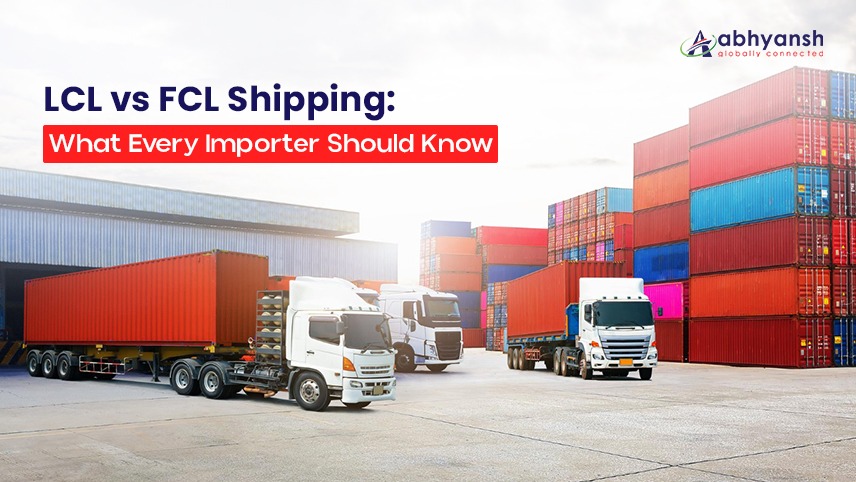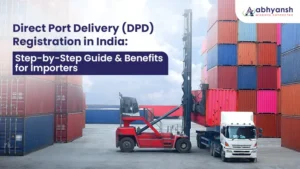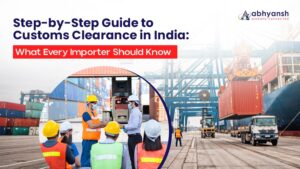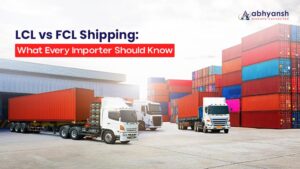In the case of international shipping, a crucial option is deciding between Less than Container Load (LCL) and Full-Container Load (FCL) shipping. The choice you make will greatly impact the cost of logistics as well as transit times and efficiency of the supply chain. In simple terms, FCL and LCL are the ocean freight analogues of Full Truckload (FTL) and Less Than Truckload (LTL) in road transport. Leading logistics company like Abhyansh Shipping understand this and offer a range of transport solutions ranging including LTL/FTL trucking, LCL/FCL ocean freight, which ensures prompt, reliable delivery for the smallest of shipments. In this guide, we’ll discuss LCL as well as FCL shipping, analyze their costs and pros and cons as well as provide advice on selecting the most suitable option for your needs.
What is LCL (Less-than-Container Load) Shipping?
The term less-than container Load (LCL) Shipping is when your goods are placed in an shipping container with other cargo from shippers. Instead of leasing the all-inclusive container, only pay for the space you’ll need usually as cubic metres (CBM). Freight forwarders or carriers combines several LCL cargoes into a single container and then separates them at the point of delivery. This is the best method for small loads that do not justification for the cost of a complete container, which allows for cost-effective transportation for cargo with low volumes.
What is FCL (Full-Container Load) Shipping?
The Full Container Load (FCL) shipping means that you get exclusive access to the entire container used for your cargo. When you make FCL shipping, the FCL shipment, only one person’s products fill a complete container that is then sealed and transported in a single piece from the point of origin to the destination. The cost is a flat amount for the container no matter if it’s packed or not. FCL is usually used for shipments with a high volume or when you require the sole utilization of a container due to security or time-related reasons. Even if the cargo you are shipping doesn’t fully fill the container You may select FCL to have the ease and security in not mixing it with cargo from other carriers.
Key Differences Between LCL and FCL Shipping
The two LCL and FCL can get your items where they’re needed to be however, there are some significant distinctions in their operation. Here are the most important elements that differentiate LCL from FCL:
- Container Space Usage: In LCL several shippers share space within one container, meaning that your cargo will only take up a portion in the box. In FCL one person utilizes the entire container. This means that LCL is equivalent to paying for a space on a vessel, while FCL is similar to hiring the entire container.
- Cost Structure: LCL Pricing is based on volume meaning you pay only for the amount that your shipment will consume with a percentage of handling charges. It comes with a lower upfront cost for smaller loads, which makes it affordable for smaller shipping. FCL Pricing is flat cost per container. For larger shipments, FCL typically is cheaper per unit, however you pay for the entire container, meaning that the initial price is more expensive.
- Transport Time: In general speaking, FCL shipping has shorter time to transit. The FCL container is able to be loaded and transported directly to the vessel, and unloaded directly at final destination with fewer stoppages and delays. LCL transports are more slow due to consolidation. The container may take a while for its filling and, when it arrives, must be separated from its container and then separated with the help of the forwarder. This creates LCL more prone to delays.
- Handling and Security: With FCL the sealed container cannot be opened until it gets to you, which means less handling and a lower chance of loss or damage. When using LCL your items are unloaded and loaded along with other items, and handled several times. This increases the chance of damage or exposure and, if the paperwork of another shipper or cargo triggers the customs inspector to inspect your cargo that could affect the entire container.
- Flexibility: LCL offers flexibility for shippers who have small, frequent deliveries and multiple locations. You can ship goods whenever you need to, without having for the full container. You can even send your goods to multiple destinations by making distinct LCL loads. FCL is not as flexible when you have a variety of destinations. every container is usually destined to one location.
In a nutshell, LCL is best for smaller, less sensitive transports or when you require flexibility, while FCL can be used for more urgent, large or delicate shipments when speed and control outweigh the cost.
Pros and Cons of LCL Shipping
Pros of LCL:
- Cost-effective for smaller Loads: LCL lets you transport without the cost of unused space. Only pay for the part of the container you require that is affordable for small-volume shipments which aren’t large enough to fit in the full size container.
- Flexible Shipment Size and Frequency: With LCL shipping, you can send at your own pace instead of waiting for the full container’s worth of items. The majority of LCL sailings are regular LCL sailings that allow the shipping of smaller orders more frequently.
- Accessible for Small Businesses: LCL reduces the barriers for small businesses to take part in international trade. Even if you’re just a small or mid-sized company with no large quantities, you can transport internationally using containers shared making shipping to the world more affordable and flexible when you expand.
Cons of LCL:
- Longer transit times: As a result due to the process of consolidation, LCL transports take longer arrive at their destination in average. Your cargo may have be awaiting until your container has been full before it can be shipped to the ocean. After that transportation, the goods must be divided and sorted. The extra steps could add days or even weeks which makes LCL less suitable for time-sensitive delivery.
- More handling (Higher risk): LCL freight is handled several times , and is shared with other shippers’ products that means a greater chance of contamination, damage or loss. The additional handling can increase the risk of misplacing or mishandling of the items as in comparison to a sealed FCL shipment.
- Complex Logistics: Having multiple shipping and parties in the same container LCL is more involved in logistical and administrative issues. Coordination an freight forwarder on consolidating, managing several sets of paperwork and customs inspections on mixed goods can result in an additional administrative burden.
Pros and Cons of FCL Shipping
Pros of FCL:
- Lower cost per unit (for large shipments: If you pay to fill the whole container with FCL however, the per-unit shipping price is typically lower for bulk shipping. If you are able to take up a large portion of a container FCL typically provides higher economics of scale over paying per the cubic meter to get the same amount in LCL.
- Faster Transit and Handling: FCL shipments typically move quicker and with less delays. After your container has been filled, it is tipped to the vessel and sets off towards its destination without necessity for consolidation or intermediary stops. When it arrives at the destination the container is shipped in its entirety.
- Lower Risk and Enhanced Security: With FCL your items are the only items inside the container. It is sealed from the beginning and left unopened until it arrives at you. This significantly reduces the chance of loss, theft or contamination as there is no other cargo that could hinder your goods. When it comes to delicate or expensive transport, this added assurance of security and safety is an important benefit.
- Simplified Logistics: The management of an FCL shipment is easier with regard to documentation and coordination. When a single shipper’s items are inside the container There are fewer people involved and less paperwork to manage, which makes the scheduling process and clearance of customs more efficient. This may result in less errors or complications in the documentation as when compared to LCL and LCL, where issues that affect one shipment could cause problems for others.
Cons of FCL:
- More expensive upfront cost: FCL requires paying for the full container, therefore the initial cost is more than shipping a single load through LCL. If the volume of your shipment isn’t large, you could have to pay for a lot of space. For those shipments that do not overflow a container, FCL is generally not economical.
- Volume Requirement: The requirement for volume is due to the structure of costs, FCL tends to make sense only if you have sufficient cargo. The implicit threshold of volume at the point at which FCL is feasible, typically when you’ve got 15 cubic meters or more, FCL may be worth considering. If you have very little cargo FCL is not practical. Furthermore, if your business is in a low or fluctuating volume, waiting to build up the full capacity of a container could delay the delivery of your goods.
- Less flexibility for small or multiple destinations: When using FCL it is the case that all items in the container are headed to a single destination. This is great if you’re transporting a large amount of goods to one location however it’s not ideal in distributing smaller quantities to multiple markets in one trip. However, LCL allows different portions of the container to be sent to various consignees. In addition, if you’re dealing with regular small orders FCL isn’t as flexible. You could have to group orders internally, and also send large quantities, which can impact the cycles of inventory.
Choosing Between LCL and FCL: Key Factors to Consider
Deciding whether to go with LCL as well as FCL ultimately boils down to your particular shipping needs and requirements as well as your priorities. Here are a few key aspects to consider when deciding on the best option for you:
-
Shipment Volume: Consider how much you’ll have to send. As a general rule small shipments are best for LCL while larger shipments that are close to a full container are best suited to FCL.
- Cost and Budget Sensitivity: Think about your freight budget and the method you prefer to pay for it. LCL is less expensive upfront and helps to preserve working capital when it comes to smaller volumes. FCL has a higher cost per unit, however If your aim is to reduce the costs for each unit FCL is the best choice for large volumes.
- Time-sensitive: If speed is important, FCL is usually faster and more predictable as it does not suffer from delays due to consolidation. A FCL container is often able to catch earlier cut-offs for vessels and move faster. LCL is a better option in cases where transit time isn’t as crucial. For shipments that require a long time to arrive either option may not be sufficient and you may want to think about air freight.
- Cargo Nature and Risk: Consider the characteristics of your merchandise. Highly valuable, fragile or fragile products (e.g. electronic equipment, foodstuffs pharmaceuticals, etc.) generally do better FCL because of the private safe environment. With no other cargo inside the container, there is a low possibility of contamination, or other’s cargo causing a problem. However it is the case that your products are sturdy and inexpensive and you’re sharing the container through LCL may be an acceptable risk in order to reduce costs.
- Frequency and flexibility: Think on the frequency you will have to ship your goods and if the size of your shipment varies. LCL is great for regular smaller shipments. It allows you to send goods out as you need them without having to wait. If your strategy for supply chain includes replenishing your inventory on time or to try new markets by sending small amounts, LCL provides that agility. If you’re able to group orders and send them large quantities on a fixed timeframe, FCL might streamline operations and cut costs per unit.
If you take these things into consideration, you will be able to make a well-informed choice about LCL as opposed to FCL for every shipment or project. There’s rarely a one-size-fits all solution, as you might choose to use LCL for certain scenarios and FCL for other situations. It is important to maximize for what’s important the most to your business at the moment, whether it cost savings, or transit speed or risk reduction.
How Abhyansh Shipping Can Help
The process of managing international shipments can be a challenge, particularly when you have to choose to choose between LCL or FCL. This is where working with a reliable logistics service can make a difference. Abhyansh Shipping, as a global logistics & freight forwarding specialist can provide individualized advice to help shippers pick the best option for each cargo. Their team will analyze your shipping’s size, timeframe and budget, to suggest either an integrated LCL service or an exclusive FCL solution.
Additionally, Abhyansh provides end-to-end support with everything from efficient inland transport (with Less than Truckload or Full Truckload alternatives) and expedited shipment, and even hazardous handling of goods to ensure that your items arrive in a timely manner and safely. Each shipment is distinct and Abhyansh is dedicated to establishing an individual plan that meets your requirements. It also offers cost-effective pricing.
Conclusion
Each of LCL as well as FCL shipping offer distinct advantages. LCL can be a blessing for smaller-sized shipments, cutting costs and allowing flexibility and flexibility, while FCL excels in larger loads with its security, speed and higher unit cost. Knowing the differences between these two can help you improve your supply chain, and eliminate unnecessary expenses. If you’re unsure of which method is best in your next delivery look into contacting an established freight forwarder like Abhyansh Shipping for advice from an expert. With the proper advice and the right services you’ll be able to take the LCL vs. FCL choice confidently, and ensure that your cargo gets moved in the most efficient manner feasible.






